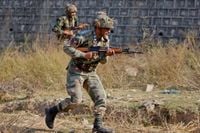In the wake of the Pahalgam terror attack that left 26 people dead, including many tourists, India and Pakistan find themselves on the brink of a military confrontation. The April 22 attack, attributed to the Pakistan-based terrorist group The Resistance Front (TRF), has escalated tensions between the two nuclear-armed nations, prompting severe retaliatory measures and a nationwide civil defense drill in India.
The Indian government has announced that on May 7, 2025, it will conduct its largest civil defense drill since 1971, aimed at preparing for potential military strikes amid fears of escalating hostilities. The Ministry of Home Affairs has mandated that mock drills be carried out across 244 districts, focusing on emergency response protocols, air raid warnings, and civilian training for hostile attacks.
Union Home Secretary Govind Mohan emphasized the importance of these drills during a high-level meeting, stating that they are essential due to the "new and complex threats" arising from the recent attack. The drills will involve participation from students, government employees, and local law enforcement agencies, ensuring that communities are ready to respond effectively to emergencies.
As India gears up for the drills, Pakistan's Defense Minister Khawaja Asif has issued warnings of a possible Indian military strike along the Line of Control (LoC). He claimed that India could launch an attack at any moment, asserting, "New Delhi will be given a befitting reply." This statement reflects the heightened anxiety in Pakistan following the Pahalgam attack and subsequent Indian military preparations.
In response to the terror attack, India has implemented a series of punitive measures against Pakistan, including suspending the Indus Waters Treaty, shutting down the operational land border crossing at Attari, and expelling Pakistani diplomats. Prime Minister Narendra Modi has assured that the armed forces have "complete operational freedom" to determine the timing and nature of India's response to terrorism.
The UN Security Council has also been involved, holding closed-door consultations to discuss the growing tensions. UN Secretary-General Antonio Guterres has called for maximum restraint from both nations, describing the situation as having reached a "boiling point." He warned that a military confrontation could easily spiral out of control.
Adding to the complexity of the situation, Pakistan has conducted missile tests in recent days, including the successful launch of its Abdali and FATAH series surface-to-surface missiles. These tests are seen as a show of strength amid fears of an impending conflict. Cross-border firing has intensified, with reports of unprovoked firing from both sides along the LoC for over a week.
On the diplomatic front, Turkey has stepped in as a potential ally for Pakistan, with Turkish military assets recently arriving in the country. A Turkish warship and military aircraft were reported to have docked in Karachi, leading to speculation about Turkey's role in the region amid rising tensions. Turkish President Recep Tayyip Erdogan met with Pakistani Prime Minister Shehbaz Sharif shortly after the Pahalgam attack, reaffirming Turkey's support for Pakistan.
As tensions escalate, the Indian government has taken further steps to enhance its military readiness, including recent successful tests of new military technologies. The Defence Research and Development Organisation (DRDO) conducted a successful combat firing of a new underwater naval mine system, and the Indian Navy has been actively engaged in anti-ship operations to demonstrate its preparedness.
Meanwhile, the situation on the ground remains tense. Local authorities in Kashmir have increased security measures, and the Indian Army has responded to Pakistani firing with proportionate measures. The Pakistani Army has claimed that it will protect its national prestige and respond decisively to any threats.
The aftermath of the Pahalgam attack has also seen public protests in India, with traders in Vrindavan shutting down shops in solidarity with the victims. The attack has reignited national sentiments against terrorism and brought calls for stronger action against those responsible.
In a broader context, the Pahalgam attack and the subsequent military maneuvers underscore the fragile state of relations between India and Pakistan. The two nations have a long history of conflict, primarily over the disputed region of Kashmir, and the recent events have rekindled fears of a potential military escalation.
As both countries prepare for a possible confrontation, the international community watches closely, urging both sides to engage in dialogue rather than resort to military action. The coming days will be crucial in determining whether diplomacy can prevail over conflict in this volatile region.



